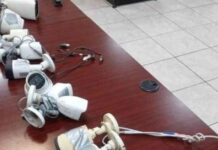A Texas doctor has been found guilty of accepting over $200,000 in kickbacks for sending patient samples to specific labs. Dr. Hector Ubaldo, a 60-year-old internal medicine specialist, was indicted in September and convicted after a two-day trial. The jury took only 14 minutes to reach a verdict on charges of conspiracy to pay and receive healthcare kickbacks and solicitation and receipt of illegal kickbacks.
According to officials from the U.S. Attorney for the Northern District of Texas, Ubaldo received cash payments from marketers in exchange for directing patients’ blood and urine samples to particular labs. These labs would then bill insurance companies and Medicare for conducting diagnostic tests. Additionally, Ubaldo signed “sham medical advisory agreements” with the labs and marketers, supposedly to provide advisory services in return for a monthly fee. However, these services were not necessary, and Ubaldo did not fulfill his end of the agreements.
Video evidence presented in court showed one of the marketers handing over thousands of dollars in cash to Ubaldo during meetings at his office. Ubaldo was recorded saying, “To tell you the truth, I need the cash.” In total, he accepted more than $253,000 in bribes. As a result of his actions, Ubaldo now faces a potential sentence of up to 15 years in federal prison and has been taken into custody pending sentencing.
This case sheds light on the issue of healthcare fraud and the unethical practices that can occur within the medical industry. Patients rely on their doctors to act in their best interests and provide appropriate care, without being influenced by financial incentives. It is crucial for healthcare providers to uphold the highest standards of ethics and integrity to ensure the well-being of their patients and maintain trust within the medical community.
The conviction of Dr. Ubaldo serves as a warning to other healthcare professionals who may be tempted to engage in similar illegal activities. The consequences of accepting kickbacks and violating healthcare laws can be severe, not only resulting in criminal charges but also damaging one’s professional reputation and credibility.
As the case of Dr. Ubaldo demonstrates, law enforcement agencies are committed to investigating and prosecuting instances of healthcare fraud to protect patients and uphold the integrity of the healthcare system. Healthcare providers must prioritize ethical conduct and transparency in their practices to prevent such incidents from occurring in the future.























